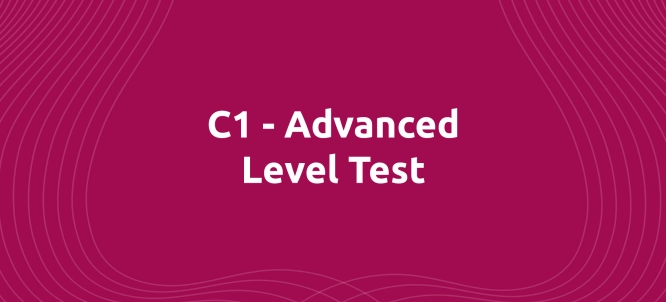by PushtoLearn
Advanced Level Test
Table of Contents
- Advanced Level Test
- 1. Mastery of Complex Vocabulary and Idiomatic Expressions
- 2. Proficiency in Advanced Grammar
- 3. Advanced Listening Skills
- 4. Reading for Nuance and Critical Analysis
- 6. Speaking with Confidence and Precision
- Common Challenges for Advanced Learners
- Everyday Use of Advanced English
- FAQ
Advanced Level Test
These tests focus on Advanced Grammar, Vocabulary and Reading skills
The advanced level of ESL (English as a Second Language) represents a significant milestone where learners demonstrate near-fluency and are capable of handling complex, abstract topics in both academic and professional settings.
1. Mastery of Complex Vocabulary and Idiomatic Expressions
Advanced tests evaluate your ability to use sophisticated and precise vocabulary. You’re expected to understand and apply idioms, phrasal verbs, academic terms, and nuanced expressions.
What’s Tested:
-
Recognition of subtle differences in meaning (e.g., "resilient" vs. "tenacious").
-
Understanding idioms and cultural expressions: “The ball is in your court.”
-
Using advanced linking words: “Nevertheless,” “albeit,” “insofar as.”
Example Question:
Select the best synonym for the underlined word:
"The solution was meticulous in its design."
a) careless
b) detailed
c) efficient
(Correct answer: b) detailed)

2. Proficiency in Advanced Grammar
At this level, you are tested on the ability to use grammar structures with accuracy and flexibility.
What’s Tested:
-
Advanced tenses: “By the time the meeting ends, they will have been discussing this issue for hours.”
-
Inversion for emphasis: “Never have I seen such dedication.”
-
Subjunctive mood: “It’s crucial that he attend the meeting.”
-
Advanced conditionals: “If I were to have known, I would have acted differently.”
|
Grammar Area |
Example |
|
Mixed Conditionals |
"If I had studied medicine, I might be a doctor now." |
|
Inversion for Emphasis |
"Little did they know what was about to happen." |
|
Relative Clauses |
"The book, the contents of which were fascinating, was a bestseller." |
3. Advanced Listening Skills
Advanced listening tests require comprehension of natural, fast-paced speech and recognition of implied meanings, attitudes, and tones.
What’s Tested:
-
Identifying key points, supporting details, and examples in lectures.
-
Understanding speakers’ intentions and implied messages.
-
Handling multiple accents and informal speech.
Example Activity:
Listen to a podcast segment and answer:
-
What is the speaker’s main argument?
-
What does the speaker imply when they say, “It’s not as straightforward as it seems”?
4. Reading for Nuance and Critical Analysis
Advanced reading tests focus on understanding complex texts, such as academic articles, reports, or literary works.
What’s Tested:
-
Distinguishing between facts, opinions, and inferences.
-
Recognizing tone and purpose (e.g., persuasive, critical, satirical).
-
Understanding dense and technical language.
Example Question:
Read the passage and answer:
-
What is the writer’s tone in this excerpt?
a) Neutral
b) Sarcastic
c) Supportive
(Correct answer: b) Sarcastic)
5. Writing Coherently and Persuasively
Advanced-level writing tests your ability to produce clear, detailed, and well-organized texts with proper style and tone.
What’s Tested:
-
Writing formal essays, research reports, or critical analyses.
-
Using persuasive language and rhetorical techniques.
-
Adopting a suitable tone for different audiences (e.g., academic vs. casual).
Example Prompt:
Write an argumentative essay (250–300 words):
"Should governments prioritize climate change policies over economic growth?"
6. Speaking with Confidence and Precision
Speaking tests at this level assess fluency, pronunciation, and the ability to discuss abstract topics or present arguments convincingly.
What’s Tested:
-
Speaking with minimal hesitation, using complex sentence structures.
-
Articulating opinions and defending arguments.
-
Demonstrating cultural awareness in communication.
Example Tasks:
-
Give a detailed presentation about a global issue.
-
Discuss the pros and cons of working remotely.
-
Respond to a hypothetical situation: “What would you do if you were the CEO of a company facing bankruptcy?”
Common Challenges for Advanced Learners
|
Skill |
Challenge |
Solution |
|
Vocabulary |
Remembering less common idioms and phrases |
Read academic and literary texts. |
|
Grammar |
Using advanced structures naturally |
Practice writing and speaking with feedback. |
|
Listening |
Struggling with implied meanings and accents |
Watch varied content (e.g., TED Talks, BBC). |
|
Writing |
Balancing formality and creativity |
Study model essays and practice editing. |
Everyday Use of Advanced English
-
Professional Environment:
-
Writing detailed emails and reports.
-
Delivering presentations or negotiating deals.
-
Academic Settings:
-
Analyzing research papers or participating in debates.
-
Writing a dissertation or a critique.
-
Social Interactions:
-
Discussing complex topics like politics, culture, or ethics.
-
Understanding humor, sarcasm, and subtle conversational cues.
FAQ
What is the CEFR level for advanced English?
Advanced English corresponds to C1 on the CEFR scale, with near-fluency.
How is advanced English different from upper-intermediate?
Advanced English focuses on nuance, precision, and abstract ideas, while upper-intermediate emphasizes fluency and general competence.
How can I prepare for an advanced ESL test?
-
Practice all four skills intensively.
-
Engage with authentic materials (e.g., books, news, academic journals).
-
Take mock tests to improve timing and accuracy.
What resources are best for advanced learners?
Books like "Advanced Grammar in Use" by Martin Hewings, academic articles, and TED Talks are highly recommended.
What does it mean to pass an advanced-level ESL test?
Passing an advanced test shows that you can use English effectively in almost any situation, from professional meetings to academic discussions.

